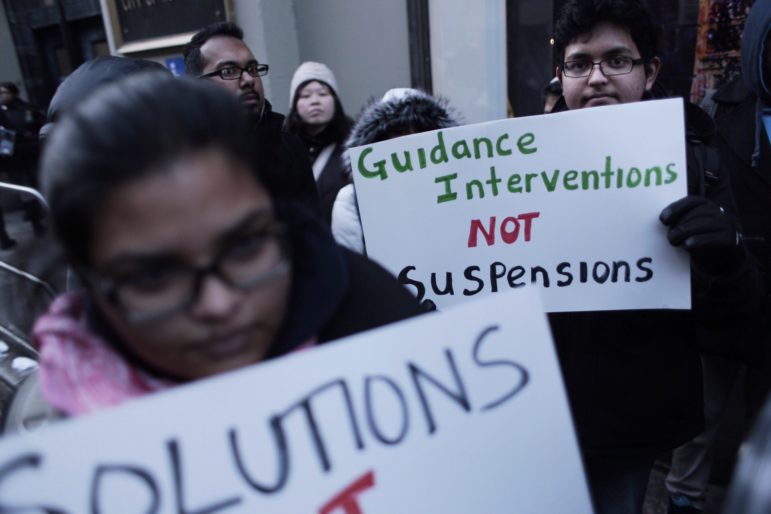“There is a looming youth mental health crisis that must be addressed, and the professionals who educate our children have the knowledge and skills to help our young people. Suspending struggling youth only compounds the crisis, and we must reimagine school discipline to ensure that all students, regardless of race or ability, can thrive in their schools.”

William Alatriste for the New York City Council
Students rally outside City Hall in 2015 calling for an overhaul of the city’s school discipline policy.Every student deserves a school year with a restored sense of normalcy and consistency. Unfortunately, too many students will have their learning interrupted this year by the exclusionary discipline of suspensions.
Suspending students from school creates a lot of harm. A report from the New York Civil Liberties Union notes that children who are suspended are “more likely to fall behind in school, be retained a grade, drop out of high school, commit a crime, and become incarcerated as an adult.” Suspensions indirectly feed the school-to-prison pipeline, as students who were already struggling fall further behind, lose hope and spend more time in environments that may not be conducive to their emotional regulation and maturity.
The report also states that “the best demographic indicators of children who will be suspended are not the type or severity of the crime, but the color of their skin, their special education status, the school they go to, and whether they have been suspended before.” An aggregate of data from 2018-2021 shows that Black and multi-racial students are twice as likely to receive an out of school suspension than students from other ethnic and racial demographics. Studies have show that adults are more likely to see Black youth as older and behaving with more intention, rather than young people who’ve made a mistake and are in need of support to learn better.
The Judith Kaye School Solutions Not Suspensions Act addresses these issues. It promotes proven methods that hold students accountable and help them learn from their mistakes, while keeping them in the classroom. For seven years, this bill has been introduced in the New York State legislature, but has not received enough support to make it to the floor for a vote. We have to change that.
There are three important things the bill would do. First, it calls for schools to eliminate suspensions for children grades K-3, because young children fall behind faster and need alternatives that keep them in the classroom as much as possible. Second, the bill would reduce the length of maximum suspensions from 180 days, which is an entire school year, to 20 days, which is about one month of school. Finally, it would provide academic instruction to those students who are suspended, to help them keep up with their schoolwork and ensure a smoother transition back into the classroom.
Most importantly, the bill calls upon all New York state schools, including private and charter schools, to incorporate proven alternatives to suspensions and create a school climate that is based on accountability, cooperation, and trust. This is a big culture shift and a needed one, especially for Black and brown students, who are being adversely impacted by the overuse of suspensions.
The trauma of the COVID-19 pandemic has left young people with gaps in both their academic and social/emotional education. It will take a robust partnership of educators, caregivers, and mental health professionals to meet the needs of our children. The losses incurred by young people during this pandemic are not only academic; there is a looming youth mental health crisis that must be addressed, and the professionals who educate our children have the knowledge and skills to help our young people.
Suspending struggling youth only compounds the crisis, and we must reimagine school discipline to ensure that all students, regardless of race or ability, can thrive in their schools. There are proven alternatives that support the healthy growth and maturity of young people, who are still learning how to handle emotional and mental challenges. The New York State Legislature must pass the Solutions Not Suspensions bill in 2023 to ensure equity for all students and create safer, more supportive school environments.
Shoshana Hershkowitz is Citizen Action of New York’s statewide organizer for education and childcare.









One thought on “Opinion: New York Students Need Solutions from Adults, Not Suspensions”
I would love the opportunity to speak to you regarding this write – up